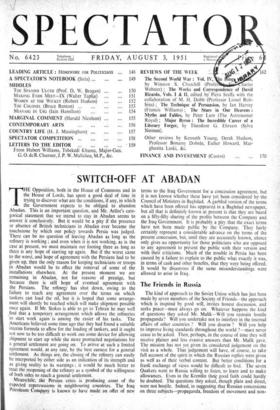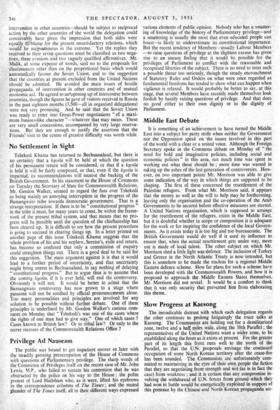The Friends in Russia
The kind of approach to the Soviet Union which has just been made by seven members of the Society of Friends—the approach which is inspired by good will, invites honest discussion, and seeks peace—must always go on. Whatever happens the kind of questions they asked Mr. Malik—Will you restrain hostile propaganda? Will you undertake not to interfere in the internal affairs of other countries ? Will you disarm ? Will you help to improve living standards throughout the world ?—must never cease to be asked. Then, perhaps, in the course of time they will receive plainer and less, evasive answers than Mr. Malik gave. - The mission has not yet given its considered judgement on the visit as a whole. That judgement will have, of course, to take full account of the spirit in which the Russian replies were given as well as of their verbal content. But better conditions for a frank exchange of.views would be difficult to find. The seven Quakers went to Russia willing to listen, to learn and to make allowances. Even in the Kremlin thei( good faith could hardly be doubted. The questions they asked, though plain and direct, were not hostile. -Indeed, in suggesting that Russian concessions on three subjects—propaganda, freedom of movement and non- intervention in other countries—should be subject to reciprocal action by the other countries of the world the delegation could conceivably have given the impression that both sides were equally td blame for the present unsatisfactory relations, which would be ma'griattimous in the extreme. 'Yet the replies they received to their seven questions must be classified as two nega- tives, three evasions and two vaguely qualified affirmatives. Mr. Malik, at some expense' of words, said no to the proposals for disarmament other than on the proportional basis which would automatically favour the Soviet Union, and to the suggestion that the countries at present excluded from the United Nations should be admitted. He avoided the main issues of hostile propaganda, of intervention in other countries and of mutual economic aid. He agreed to an•opening up of intercourse between countries, though the figures he gave of visitors received in Russia in the past eighteen months (3,500—all in organised delegations) were not very promising. And he said that the Soviet Union was ready to enter into Great-Power negotiations " of a maxi- mum businesslike character "—whatever that may mean. These are very small concessions, accompanied by very large reserva- tions. But they are enough to justify the assertion that the Friends' visit to the centre of greatest difficulty was worth while.































